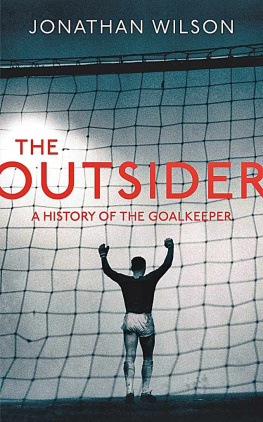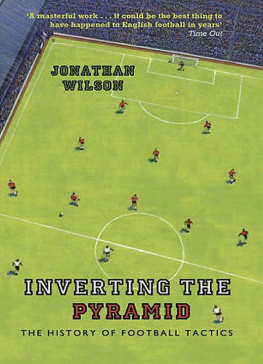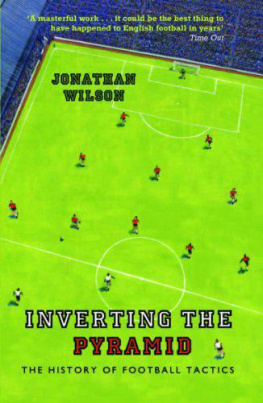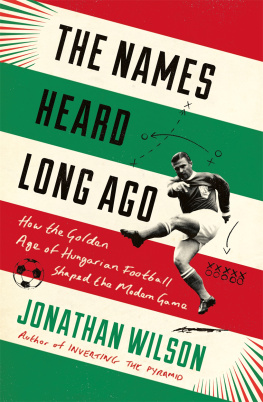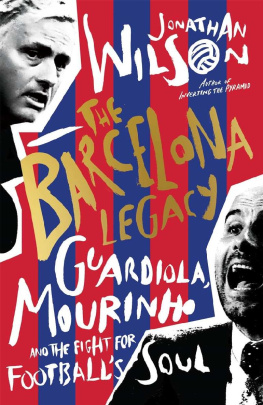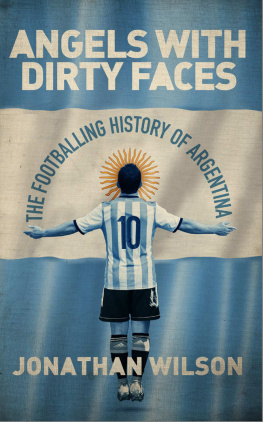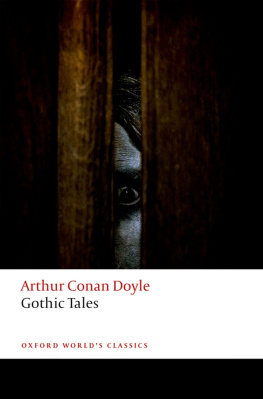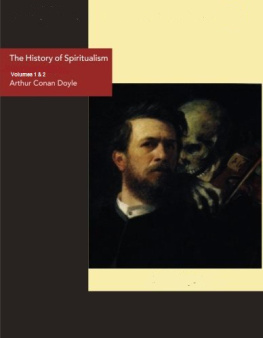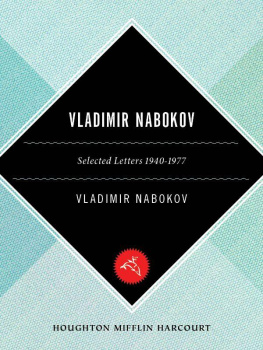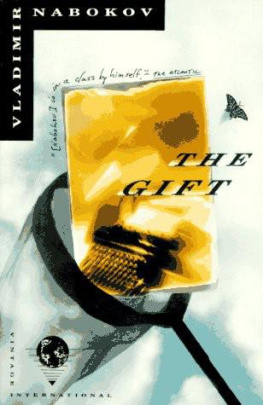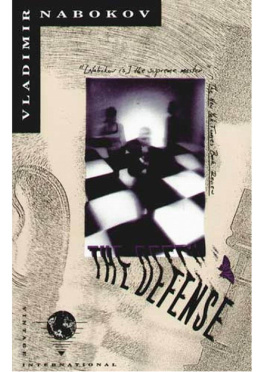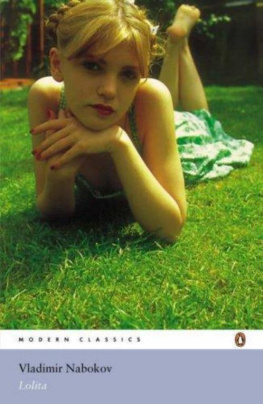THE OUTSIDER
A History of the Goalkeeper
JONATHAN WILSON

CONTENTS
ACKNOWLEDGEMENTS
All books are to a large extent collaborations. Theres one name on the cover but a multitude of people behind that whose contributions deserve recognition and to whom I am extremely grateful. The willingness of so many people to offer their assistance so readily has been humbling.
In Cameroon, thanks to Willie Niba for his help in arranging interviews and translating, to Thophile Abega and Jean Manga-Onguen for their hospitality, to Jean-Paul Akono and Robert Atah for going out of their way to give me lifts, and to Adjutant Kwang for his driving and general air of authority. Thanks to Ian Hawkey for nudging me, however inadvertently, towards the story of Bob Mensah in Cape Coast (sadly that Peter Crouch to Mysterious Dwarfs transfer still hasnt come off) and to Silas Akowuah at the archive of the Daily Graphic in Accra. Thanks in Ghana also to Yao, for not getting lost too often and only starting to sing right at the end of the trip.
In Brazil, thanks to Tim Vickery and Arturo Hartmann for arranging interviews and interpreting and to Cassiano Gobbet and Rodrigo Orihuela for their hospitality and advice. In Argentina, thanks to Sebastian Garcia, Joel Richards and Araceli Alemn for information and assistance with translation. For their work with logistics, research and translation, thanks in Serbia to Vladimir Novak, in Hungary to Sandor Lczk, in Poland to Maciej Iwanski, in Romania to Emanuel Rou, in Ukraine to Taras Hordiyenko and Oleksandr Sereda and in Russia to Igor Rabiner, Ivan Kalashnikov and Vladimir Soldatkin.
Thanks to James Horncastle for all his help in researching Italian goalkeeping, to Richard Jolly for his work in the northwest and to Alex Jackson and Sally Hawley from the National Football Museum for sharing their knowledge of football before the First World War.
Thanks to all at the British Library at St Pancras and the British Newspaper Library at Colindale and to the dozens of people who gave up their time to be interviewed.
Thanks also to Jon Adams, Philippe Auclair, Sheridan Bird, Duncan Castles, Dan Colasimone, James Corbett, Michael Cox, Miguel Delaney, Gavin Hamilton, Uli Hesse, Raphael Honigstein, Graham Hunter, Juliet Jacques, Sam Kelly, Simon Kuper, Sid Lowe, Musa Okwonga, Ed Malyon, Gabriele Marcotti, Kevin McCarra, Scott Murray, Paul Myers, Lars Sivertsen, Rob Smyth, Grant Wahl and David Winner for offering guidance, advice and various nuggets of information.
Thanks to my agent, David Luxton, my editor, Ian Preece, my copy editor, John English, and to Jillian Young and Alan Samson at Orion.
And thanks, particularly, to Kat Petersen, for her patience, support, eagle-eyed assessment of the text and generally for putting me right.
... in disgrace with fortune and mens eyes, I all alone beweep my outcast state...
William Shakespeare, Sonnet IXXX, 1-2
PROLOGUE
My greatest sporting moment? Thats easy. It was the final minute of a school hockey match against Whickham, the only side in the North East who could touch us. It was 00 and they had a short corner. The ball was pushed out, two defenders charged and the ball was stopped for their centre-half, who was called Robson and was in the England youth squad. He shaped to strike the ball but in the end decided to flick it. As he did so, the thought went through my mind that he was outside the D. I remember thinking, as the ball rose to my right, that I ought at least to dive for it even if he were outside the D. Everything seemed to be happening very slowly. I even remember wondering what the rule was if he had shot from outside the D and the ball glanced in off my stick. Looking through the grille of the helmet, I could see the red airtex sleeve of my shirt, my fat white glove, and the black and blue of my stick. I could also see the ball, its trajectory taking it a little above the stick. Apparently having all the time in the world, I moved my wrist, angling the stick to intercept the ball. The intersection of post and bar came abruptly into view and, about six inches in front of the top corner of the net, the ball slapped into the meat of the stick. I glanced down and again I remember the mental process clearly and was shocked at how high up I was, and immediately concerned by how much it was going to hurt when I hit the ground.
It didnt; one of the few advantages of being a hockey keeper is that the entire front of your body is covered in two inches of stiff foam. I could see the ball spinning loose and, for a split second, nobody seemed to be moving towards it. In that moment there was a glorious stillness, a silence. It was a sensation Id never had before and one that Ive only had once since when I took a diving catch at short midwicket to end a stubborn ninth-wicket partnership as the Oxfordshire village for whom I was playing won a low-scoring match against the BBC. That time, as I saw the ball slap into my left palm, I even thought, This is just like that game against Whickham, before landing on a painful combination of shoulder and hip.
Two instances, twelve years apart. For somebody who has played some kind of sport on average at least once a week for thirty years, it doesnt seem much, but at least Ive felt it. Im sure proper sportspeople regularly get that sensation of time slowing down, of being utterly in control. As the Ajax coach David Endt put it, The seconds of the greats last longer than those of normal people. There is evidence to suggest the memory of control is false, that it is an invention of the brain to explain a reflex reaction that begins in the muscles themselves. Wherever it originates, that sensation of control over fractional changes happening extraordinarily quickly seems to lie at the heart of sporting excellence.
The very best must have it most of the time. That first occasion, I thought it might be a perpetual state, that I might, through practice, have attained some level at which time and my reflexes were in harmony. I even expounded at what must have been deeply tedious length on the possibility that night on the minibus to York for a Latin lecture. Nobody cared. I was like the hobbits returning to the Shire to find everybody too wrapped up in their own mundane lives to care about my adventures. But who knew what heights I could scale? If I could claw a flick from an England midfielder away from the top corner, then what was to stop me making the England squad?
The next game we played was the following week, away at Hall Cross School in Doncaster. I hadnt had much to do when, shortly before half-time, their forward turned in a crowded D and shot. I was unsighted, but threw myself down, thinking my prone body would provide a barrier. It would have done, but he mishit it dreadfully and the ball slithered through the tiny space between my feet and the post. We went on to lose 40 and, by a generous estimate, two of the other three goals were my fault. On the bus back, I was exiled to the front seat next to the teacher. That was my dreams of greatness over. It was also the end for me as a goalkeeper. It was never quite the same after that.
I played on that season but by the time I got to university, after a year of teaching in a Tibetan monastery and washing dishes in a Sunderland pub, I decided I didnt fancy having the ball pinged at me at speeds that left bruising even through the padding for the occasional fleeting moment of glory that nobody cared about and the certainty that, sooner or later, youd have a game bad enough that you wouldnt be able to stop thinking about it for well, its nineteen years since the Hall Cross game and it still niggles.

